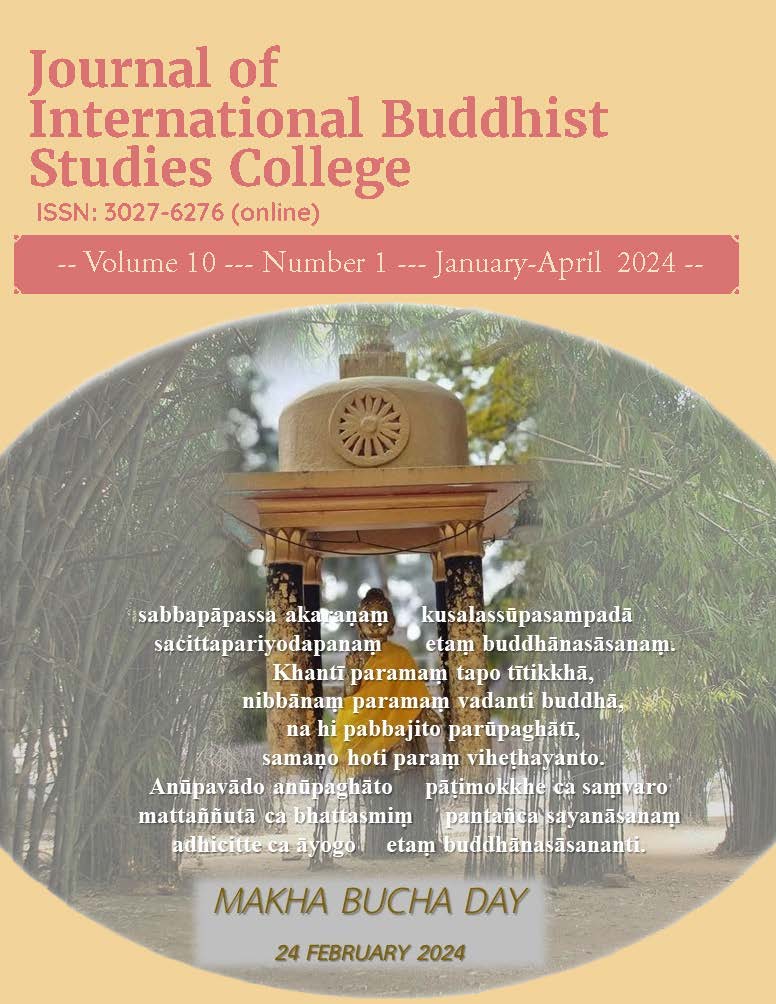An Analysis of the Alignment of the King’s Philosophy Demonstrated in the Khao Hin Sorn Royal Development Study Center with the UN Sustainable Development Goals
Main Article Content
Abstract
King Bhumibol Adulyadej had been promoting self-reliant or sustainable farming since the 1950s and it was later widely called the Sufficiency Economy Philosophy or SEP. The Office of the National Economics and Social Development Council has included the SEP in its National Economic and Social Development Plan since 2002. The 13th National Economic and Social Development Plan for 2023-2027 has focused on tangible development implementations and has adopted both SEP and UN Sustainable Development Goals (SDGs) as part of its main principles. SEP and SDGs seem to align in the high-level strategies and this study serves as evidence at the operational level. The objectives are to 1) to study the King’s Philosophy and the Khao Hin Sorn Royal Development Study Center 2) to study the UN SDGs 3) to analyze the alignment of the King’s Philosophy demonstrated in the Khao Hin Sorn Royal Development Study Center with the SDGs. The study is done by documentary research.
The study found that the King’s Philosophy is the wisdom of His Majesty the late King Bhumibol Adulyadej the Great derived from his exploration aiming to improve Thai people’s living conditions. The Sufficiency Economy Philosophy or SEP is the foundation of King’s philosophy with three concepts: moderation, reasonableness and risk management plus all-round knowledge, and morality. Six Royal Development Study Centers were created in all regions to provide a one-stop service that shows research and demonstrates operational success. The Khao Hin Sorn Royal Development Study Center was the first center in Thailand and has proven outcomes of changing degraded land into healthy areas and providing training to villagers and the public. The UN SDGs were agreed in 2015 by 193 country members, including Thailand. The 17 goals can be grouped into five dimensions including people, prosperity, planet, peace and partnerships, with the hope to end poverty, protect the planet, and tackle inequalities, which leave no one behind. The Khao Hin Sorn Royal Development Study Center’s activities directly support 14 goals, covering all five dimensions, out of 17 SDGs, and could serve as one of the concrete examples for other national and international communities to strive to reach their SDGs.
Article Details
The Journal of TCI is licensed under a Creative Commons Attribution-NonCommercial-NoDerivatives 4.0 International (CC BY-NC-ND 4.0) licence unless otherwise stated. Please read our Policies page for more information on Open Access, copyright and permissions.
References
Chattrika Bangkaew. (2018). Management Achievement of the Royal Development Study Centers. Journal of Rangsit Graduate Studies in Business and Social Science. 4(2), 339-351.
Khao Hin Sorn Royal Development Study Center. (2017). History and Background. Retrieved January 23, 2024, from https://www.khaohinsorn.com/history/
Office of the National Economic and Social Development Council, Office of the Prime Minister. (1 October 2022). The 13th National Economic and Social Development Plan (2023-2027). Retrieved January 23, 2024, from https://www.nesdc.go.th/nesdb_en/ewt_dl_link.php?nid=4500
Office of the Royal Development Projects Board (ORDPB). (December 2018). Information on Khao Hin Sorn Royal Development. Retrieved January 25, 2024, from https://km.rdpb.go.th/Knowledge/View/92
Office of the Royal Development Projects Board (ORDPB). Royal Development Study Centres (RDSCs), Retrieved January 23, 2024, from https://www.rdpb.go.th/en/Studycenter/background-of-the-rdscs-c57
Permanent Mission of Thailand to the United Nations. (5 January 2024). SEP for SDGs Partnership. Retrieved January 23, 2024, from https://unmissionnewyork.thaiembassy.org/en/content/38134-sep-for-sdgs
Phra Rajvaramethi and Lampong Klomkul. (2019). Sustainable Strategy for Agricultural Development by His Majesty King Bhumibol of Thailand. ASEAN Journal of Religious and Cultural Research. 2(2), 9-15.
Phramaha Hansa Dhammahaso, Phrakrupalad Adisak Vajirapanno, Sakchai Sakabucha and Nadnapang Phophichit. (2022). Concept of “Khok Nong Na Model” for Sustainable Development”. Journal of Arts Management. 6(1), 419-434.
Royal Chitralada Projects. (2023). History. Retrieved January 23, 2024, from https://www.royalchitraladaprojects.org/#about
Sataporn Books Academic Team (2018). Six Model Development Study Centers: Learning Sustainable King’s Philosophy. Bangkok: Sataporn Books.
SDG Move. (2022). Basic Information about SDGs. Retrieved January 23, 2024, www.sdgmove.com/intro-to-sdgs/
SEP4SGDs. (30 November 2022). SEP for SDGs Partnership, Retrieved January 25, 2024, from https://sep4sdgs.mfa.go.th/en/page/70261-sep-for-sdgs-partnership?menu=5d6bd9a415e39c1868002d64
Siriwan Arparmongkol and Thanaphon Phumala. (2017). Information Management for the Success of Knowledge Dissemination in the Royal Development Study Center: A Case Study of Khao Hin Sorn Royal Development Study Center. Journal of Arts Management. 1(1), 27-32.
The Chaipattana Foundation. (2017). Philosophy of Sufficient Economy. Retrieved January 23, 2024, from www.chaipat.or.th/eng/concepts-theories/sufficiency-economy-new-theory.html
The Office of Committee 1, The Secretariat of the House of Representatives. (2017). The Committee of King’s Philosophy Drive under National Reform Steering Assembly’s Report on “The Drive for King’s Philosophy for Country Reformation”. Bangkok: Parliament Print.
United Nations. (2024). Sustainable Development Goals. Retrieved January 23, 2024, from www.un.org/sustainabledevelopment/sustainable-development-goals/


